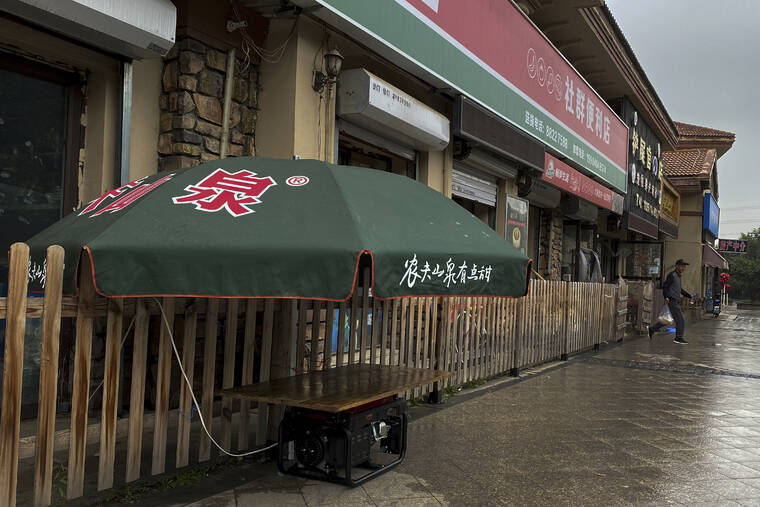Chinese people switch to flashlights and generators during power outages
[ad_1]
SHENYANG, China >> People in northeast China had breakfast under the light of smartphones and shopkeepers turned on generators while much of the country forced power outages on Wednesday to meet official conservation goals and alleviate bottlenecks in some areas.
News reports blame high coal prices for the reluctance of energy companies to meet booming demand, while economists say the real motive is political: officials are under pressure to cut energy use to meet official targets.
In Shenyang, the northeastern’s most populous city, restaurant owner Li Yufeng used a battery from an electric bicycle to power a pot for noodles after seeing an announcement that the power would be turned off at 7:30 a.m. to 6 a.m. to make chicken, sauces and to prepare other dishes.
“There is some impact, but not a major impact,” Li said as customers ate at smartphone lights.
Factories in China’s busiest manufacturing provinces have been ordered to suspend production for up to a week, raising concerns that global supplies of smartphones and other goods could be disrupted. Now urban neighborhoods are being blacked out, triggering calls on social media to the government to solve the problem.
China’s electricity consumption is growing almost twice as fast as usual as the ruling Communist Party tries to reduce energy intensity, or consumption per unit of economic output.
The blackouts come as world leaders prepare to video-link a UN environmental conference on October 12-13 in the southwestern city of Kunming. This increases the pressure on President Xi Jinping’s government, hosting the meeting, to show that it is sticking to its emissions and energy efficiency targets.
The cuts are “mainly driven by measures to control energy use, with power shortages affecting some other provinces,” IHS Markit’s Lara Dong said in an email.
“This is in line with China’s decarbonization ambitions,” she said.
The cabinet’s planning agency warned in August that 20 regions had exceeded energy use and pollution targets after production recovered from the pandemic. The government has ambitious plans to make the economy cleaner and more energy efficient, so failing to meet these goals can be the end of your career.
The blackouts “could be more disruptive than previous bottlenecks,” Bank of America said in a report. Due to bottlenecks in some areas, it said, “a relaxation of the government’s energy consumption targets may not be able to alleviate the electricity shortage immediately”.
China is one of the largest emitters of climate-damaging industrial gases worldwide and consumes more energy per unit of economic output than industrialized countries. Given its huge population, it is much lower on a per capita basis.
China is also preparing for the Winter Olympics in the capital Beijing and the nearby city of Shijiazhuang in February, a time when it wants clear blue skies.
Officials in Jiangsu Province, a manufacturing center northwest of Shanghai, told state media that some cities there had consumed 90% of this year’s electricity quota. Provincial planning officials were quoted as saying that each city government must decide how to achieve its goals.
The government of Guangdong Province, China’s largest manufacturing center, has set both official limits for energy consumption and low water levels in hydropower plants that provide a large part of their electricity.
In Liaoning Province, where Shenyang is the capital, the government said in a statement on Sunday that electricity demand reached a record high in the first eight months of the year. Liaoning has since suffered from bottlenecks due to a decline in wind power and other sources.
The government of neighboring Jilin Province blamed a coal shortage. A statement on Monday said his governor would visit miners in nearby Inner Mongolia to raise additional supplies.
Some power blackouts warned residents of Shenyang and other cities about the need for power rationing, but not why.
Li, the owner of the noodle restaurant, showed a reporter a message posted on social media that the power would go out in his neighborhood from 7:30 a.m. to 4:30 p.m.
Store owner Yang Chang ran a generator on the sidewalk to keep the meat freezers cold.
“As long as there is electricity, we can sell things, unlike restaurants that need water,” said Yang. Yang didn’t know what caused the blackout, but he said, “It’s understandable.”
“I was born in the 90s. When I was little, the current was not stable, â€said Yang. “Although we have difficulties, the government will find a solution.”
[ad_2]

